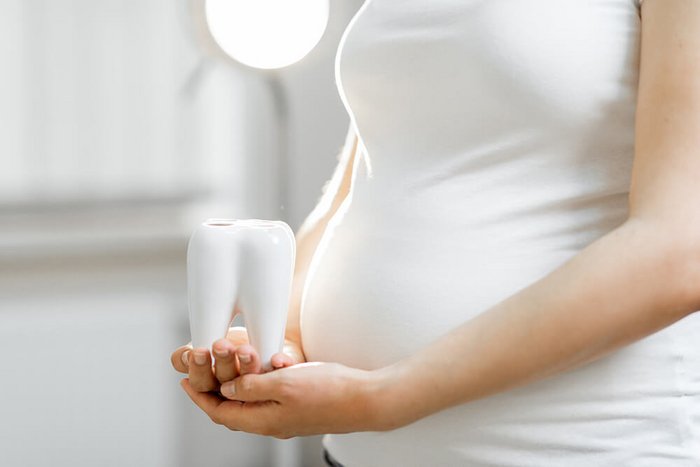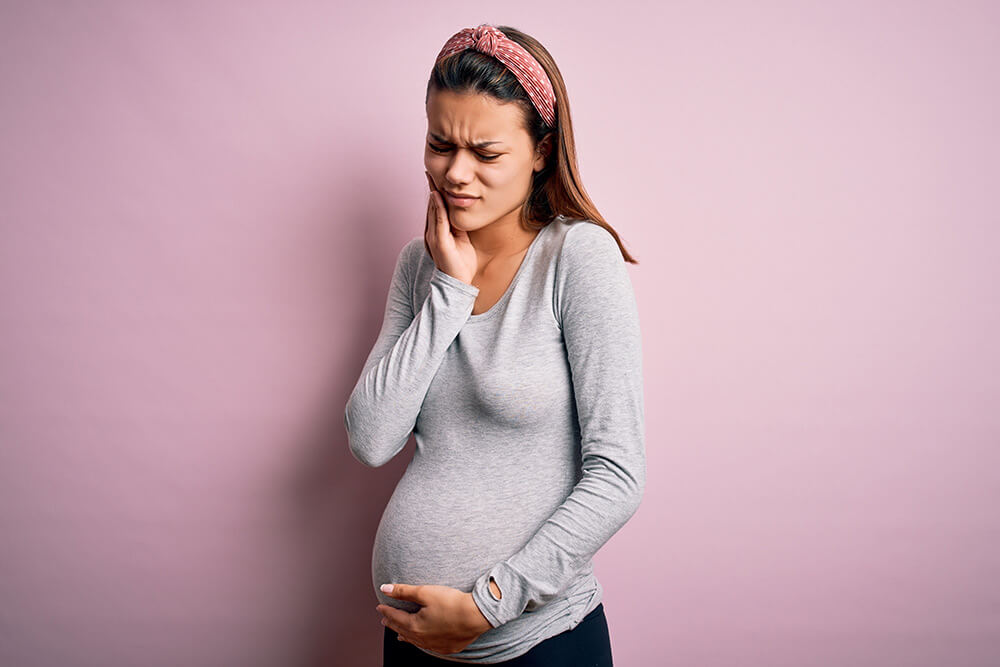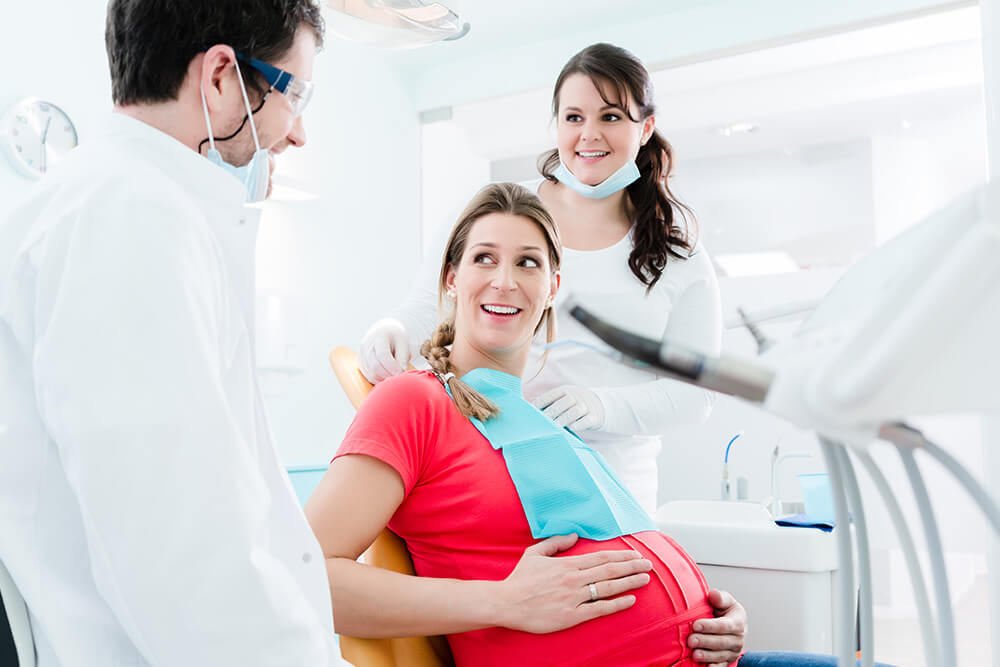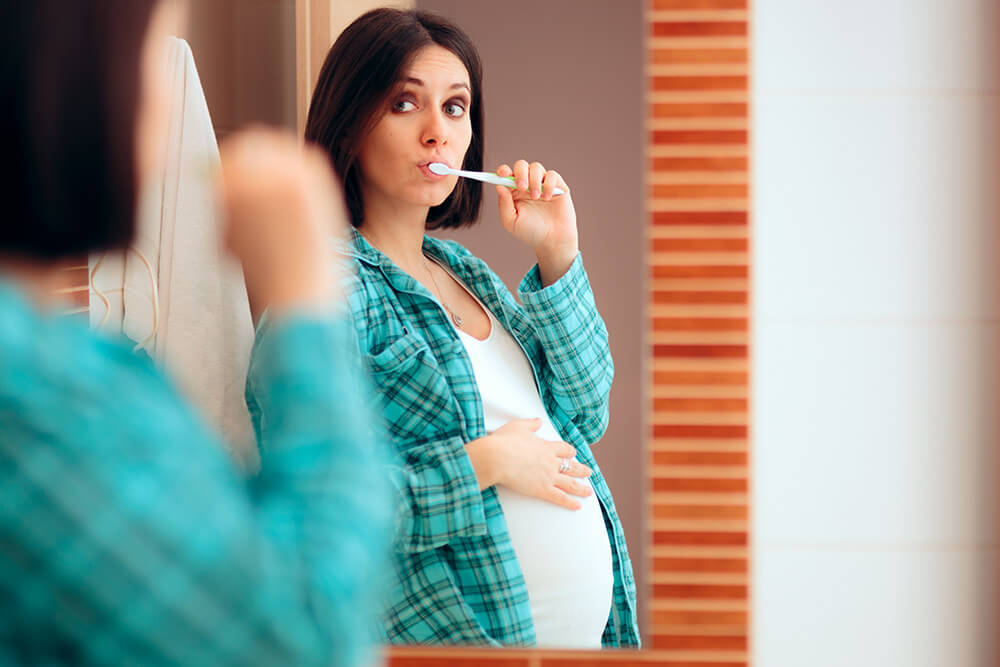Toothaches and dental problems during pregnancy
Pregnancy is a special time for every woman. There are many things that mothers-to-be become much more aware of. Oral health, for example. Toothaches, bleeding gums or sensitive teeth may be more frequent or are perceived more consciously. An old saying goes "a woman loses a tooth for every child“. However, today there are many ways to keep the teeth and gums healthy during pregnancy.
This article will show you what pregnancy means for your dental health and when you should see your dentist. Additionally, you will learn more about the external effects from chemicals and what they mean for the new life you are carrying. We will also inform you about what you can do for a healthy mouth and healthy teeth.
Inflammation of the gums in pregnant women
During pregnancy, there are the obvious physical changes and some that are not visible to others. While most changes are positive, there may also be isolated problems. These include bleeding gums and sensitive teeth. Both of these can be a sign of gum inflammation (gingivitis). And pregnant women are especially susceptible to inflamed gums1, which is why the term pregnancy gingivitis became common.
There can be many reasons for this. One of the causes is a change in the hormone balance. During pregnancy, the body produces large quantities of oestrogen and progesterone. These two hormones cause the gums to develop inflammation on the one hand (oestrogen) and also promote chronic inflammation (progesterone). Additionally, the tissues are softened and the gums have a tendency to bleed. In a worst-case scenario, the microorganisms in the mouth can lead to severe inflammation of the gums and tooth loss.
The first inflammatory changes in the gums are often seen when brushing the teeth. The risk of gingivitis continues to increase up to the last trimester of pregnancy. After giving birth, gingivitis usually heals completely and the sensitivity of the gums disappears.
If left untreated, gingivitis can lead to periodontitis (inflammation of the supporting tissues of the teeth) and tooth loss. If periodontitis is diagnosed, it should be treated before pregnancy if possible, as it can lead to complications in pregnancy if left untreated.
Furthermore, in rare cases, a benign growth of the gums can occur, known as pregnancy epulis. This growth may cause pain, but usually goes away after pregnancy. It is rarely necessary for it to be surgically removed by the dentist after pregnancy.
Sensitive teeth due to morning sickness
Many pregnant women suffer from nausea and vomiting, especially during the early months of pregnancy. The aggressive gastric acid attacks the tooth enamel and weakens it. This frequently leads to sensitive teeth because the breakdown of the enamel exposes the dentin below it. Gastric acid also makes the teeth more susceptible to caries.
Using toothpaste with hydroxyapatite is recommended to protect the enamel. A protective layer is formed on the teeth. If you have to vomit, this protective layer prevents the acid from attacking your teeth.
After vomiting, you should first rinse your mouth with water or use a mouthwash with hydroxyapatite before brushing your teeth. Otherwise there is a risk that you could "brush away" even more enamel.
Increased risk of caries during pregnancy
Food cravings are common during pregnancy. The increased frequency of sugary sweets means constant stress for the enamel. Frequent cravings for sugar mean that the bacteria in the mouth always have "food". As a result, the microorganisms produce acids that attack the teeth and lead to tooth decay.
As often as possible, sugary sweets should be replaced by fruit, or better still, vegetables. It is important to reduce the number of sweet snacks between meals. Try to eat chocolate and the like after a main meal. Brush your teeth regularly (2-3 times a day). Another option is to rinse out your mouth with water. In general, you should drink water or milk, less often juice and ideally no soft drinks. Soft drinks not only contain a lot of sugar, they also have acids that damage the enamel.
A balanced diet is important during pregnancy, not only for you, but also for your unborn child. Ensure that you get good nutrition. Your diet significantly affects the nutrients and minerals your unborn child gets. They include not only vitamins, but sufficient calcium as well. Remember that you need more calcium than normal because you are also feeding a growing child. Calcium is important for maintaining healthy bones and teeth. For your teeth, it is possible to use dental hygiene products with hydroxyapatite and calcium such as Karex Tooth Protection Gel.
Seeing the dentist during pregnancy
It is generally recommended that you see a dentist when you first get pregnant. Your dentist should be informed that you are pregnant. Have your teeth and gums checked and treated if necessary.
Dental treatment is generally possible even during pregnancy. It is important that you tell your dentist you are pregnant so that he can decide whether to use a local anaesthetic and if so, which one. A good time for treatment and professional teeth cleaning is the middle of pregnancy, from the fourth to seventh month. In the beginning, there is a risk that organ formation in the embryo could be affected, later in pregnancy there is a risk of premature birth due to stress. However, in general, major treatment should be carried out before a planned pregnancy or after the child is born.
Tooth and gum problems should still be investigated at any time and pain should be treated as soon as possible. Although the foetus is not affected by dental diseases, it is indirectly affected when your pain leads to an increased release of stress hormones.
In the further course of the pregnancy, you should have only urgently needed dental treatment.If dental treatment is necessary, local anaesthetics that are suitable for pregnant women can be used.
However, larger procedures should be postponed until after pregnancy if possible. Procedures such as dental X-rays, administering certain medication (e.g. antibiotics) and general anaesthesia have an effect on your unborn child and should not be carried out.
If it is nevertheless necessary to take antibiotics during pregnancy, discuss this with your gynaecologist and dentist. Some antibiotics (e.g. tetracyclines) can severely impair the development of the teeth and bones in the unborn child.
Fluoride during pregnancy?
Fluorides are contained in many toothpastes and mouthwashes and also in fluoride varnishes that may be used only in dental practices. Even some brands of salt and mineral water contain larger quantities of artificially added fluoride. Fluorides are used for caries prevention in dental hygiene products. Toothpaste, mouthwash and fluoridated salt are the most common sources of fluoride intake (for example by swallowing) in Germany.
A number of scientific studies have indicated that fluoride can potentially cause developmental disorders in unborn children2. While the placenta ensures that fluoride that is absorbed in small amounts does not enter the foetal bloodstream, larger amounts are not held back by this barrier.
Although no current data are available on how much fluoride is taken in by pregnant women in many parts of the world and what the effect on the embryo is, fluoride intake should be minimised.
For toothpaste and mouthwashes, there are now alternatives for cavity protection that are just as effective as fluoride3. Hydroxyapatite has been investigated in many studies and its effectiveness for cavity prevention has been repeatedly confirmed4.
Tips for pregnant women: the right dental hygiene
During pregnancy, good tooth brushing habits and appropriate oral hygiene are key to preventing tooth and gum problems in this special time:
- Brush your teeth twice a day to reduce plaque and bacteria. Use a soft toothbrush and do not apply too much pressure. This protects your teeth and gums.
- In addition to tooth brushing, use dental floss or interdental brushes to clean the interdental spaces.
- Mouthwash ensures that the entire oral cavity is cleaned.
- If you often have morning sickness and the toothbrush triggers a gag reflex, rinse your mouth thoroughly in the morning with mouthwash – that is better than no oral hygiene at all. You can also try to apply the toothpaste to the teeth and rub it in with your finger. Resume tooth brushing when the nausea has improved.
- Remember the screening examinations at your dentist. The dentist can support oral hygiene with a professional teeth cleaning.
- Make sure you get enough calcium in your diet (e.g. milk/dairy products and vegetables) to strengthen your teeth and avoid calcium inhibitors (e.g. coffee, chocolate and sugar). A tooth gel such as KAREX Tooth Protection Gel adds additional calcium to strengthen your teeth.
- Reduce sweets to prevent cavities. If you eat sweets, you should brush your teeth afterwards to remove all food debris.
- Avoid food and beverages that cause sensitivity and use a tooth gel to reduce the pain in sensitive teeth.
This might also interest you

Sensitive teeth – when enjoying food becomes impossible
Sensitive teeth are often caused by exposed tooth necks or defects in the dental enamel, find out more about this.

Inflammation of the gums: Gingivitis or periodontitis?
More than 50% of adults suffer from gum problems. Find out more about what can help.

Caries: How to protect your teeth
Caries is one of the most common diseases in the world. Find out more about the caries and its causes.
Sources:
- Laine, M.A.: Effect of pregnancy on periodontal and dental health; Acta Odontologica Scandinavica; 2002 Oct; 60(5): 257-64;
https://pubmed.ncbi.nlm.nih.gov/12418714/ - Green, R. et al: Association Between Maternal Fluoride Exposure During Pregnancy and IQ Scores in Offspring in Canada; JAMA Pediatrics; 2019; 73(10): 940-948; https://jamanetwork.com/journals/jamapediatrics/fullarticle/2748634
- Schlagenhauf, U. et al.: Impact of a non-fluoridated microcrystalline hydroxyapatite dentifrice on enamel caries progression in highly caries-susceptible orthodontic patients: A randomized, controlled 6-month trial.; J. Invest. Clin. Dent. 10, e12399 (2019);
https://www.karex.com/de-de/forschung/studien/klinisch-belegt-karex-mit-hydroxylapatit-schuetzt-vor-karies - Enax, J., Fabritius, H.-O., Amaechi, B. T. & Meyer, F.: Hydroxylapatit als biomimetischer Wirkstoff für die Remineralisation von Zahnschmelz und Dentin. ZWR - Das Deutsche Zahnärzteblatt 129, 277-283 (2020);
https://www.karex.com/de-de/forschung/studien/hydroxylapatit-als-biomimetischer-wirkstoff-fuer-die-remineralisation-von-zahnschmelz-und-dentin



![[Translate to en_DE:] Magensäure bei der Schwangerschaftsübelkeit greift den Zahnschmelz an [Translate to en_DE:] Schwangerschaftsübelkeit und Zahngesundheit](/fileadmin/user_upload/karex.com/images/content/zahnpflege/schwangerschaft/karex-teaser-schwangerschaftsuebelkeit-und-zahngesundheit.jpg)





